A lengthy back-to-back evening of city council meetings took place on Monday night. Emotions ran high as the council covered a number of hot button issues: homeless encampments, the April 1st neo-Nazi activity, police funding, and citizen ballot initiatives.
First Meeting
The first meeting began at 4:00 PM. No open public comment period took place.
Mayor Snyder opened with an explanation of the double-meeting format, a procedural loophole that allows the Council to dispatch with both monthly meetings in a single night. While having two consecutive meetings may seem like just one long meeting, technically it isn’t. This has been employed in the summer months for many years; the intention is to provide a less rigorous schedule during the summertime for councilors, city staff, and the public alike.
Recognitions and Appointments
After this introduction, the Mayor continued with two recognitions, the first of long-standing city employee and leader Kathy Alves. Her long career, most recently with the Public Buildings & Waterfront Department, comes to end with her retirement; Snyder and City Manager West both offered touching thanks. Mayor Snyder also conveyed deep thanks from the organization TEMPOart, an art installation nonprofit, to a number of cooperative city representatives.
As this was the first meeting of Fiscal Year 2023/24, the first order of the night was also Order #1 of the year, and it was the appointment of Michael Murray, another long-serving employee who worked his way up from the Cemeteries Office, as new Director of Public Works. Only George Rheault gave public comment on his appointment, pointing out that this is a post usually held by an engineer or other specialist beyond Murray’s credentials, and he asked for more transparency and accountability for such high-level appointments. The Council voted unanimously to appoint Murray, who then made a brief speech thanking the council for the appointment, calling it “the capstone of my career.”
The second item of the evening was also an appointment, this time en masse for multiple volunteer positions on boards and committees across city departments. Mayor Snyder spoke briefly ahead of the vote, thanking the legislative and nominating committee and the citizens who volunteer for these positions. The council then unanimously approved the matter, passing it as an emergency so that the roles would be filled immediately. While the individuals appointed were not dwelled on by the council, we have posted a list below –
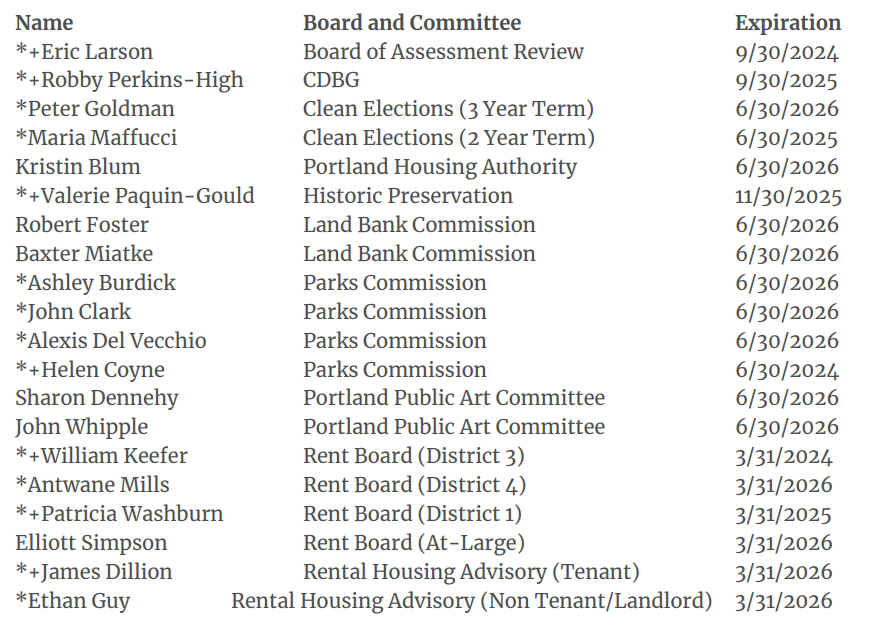
Two consent items followed, announced together: first, the annual Festival of Nations, taking place on July 29th in Deering Oaks Park; second, the civil forfeiture of funds and a handgun to the Portland Police following the arrest of Raymond Whittington, suspected of drug-related felonies.
Rheault commented on this matter as well, asking if Whittington had been convicted yet, what would happen to the weapon in the case of Whittington, and where the money would go. He also asked if the organizers of the Festival of Nations would be required to pay the permitting fee for the event. Michael Odokara, whose mother is the organizer of Festival of Nations, added in a public comment that the festival is sponsored by many local businesses, including L.L. Bean, Kennebec Savings Bank, and Wex, among others. He thanked the council for their longstanding cooperation with the event.
Councilor Dion, a former police officer and current attorney, provided additional context for the forfeiture. He explained that the money in cases like these is not assumed to be the legitimate property of the accused, and that the burden of proof rests on Whittington to prove that the funds are legitimate and not the product of criminal activity. He added the amusing fact that such forfeitures are described by the court as if the money itself was the defendant, e.g. State of Maine v. 120,000 Dollars. City Manager West clarified that the money seized in the forfeiture would be used at the discretion of the police chief and that the weapon would be destroyed.
Communications
The first communication of the night concerned property tax assessments. In recent years the city has fallen short on performing routine property assessments, in part due to the COVID-19 pandemic. West stated that increasing the frequency of revaluations is a priority for the assessor’s office going forward, and encouraged the Council to prioritize resources for revaluations in the Fiscal Year 2025 budget. Snyder chimed in, thanking the city staff who have made this project a priority, and reiterating the importance of resourcing such a project in the budget.

The next communication was an update on the city’s response to the April 1st neo-Nazi demonstration. According to the City Manager, the city has identified four steps to respond to the rally: first amendment training for police officers; hate and bias incident documentation, in which “the PPD will consider implementing a process… where no crime occurs, but information is documented to the best of the officer’s ability”; adding a new police response level for first amendment activity; and restaffing and expanding community policing and police intelligence.
Some officers have already completed the first amendment training; the contents of the training were not specified in the communication.
The response from the Council on this matter was mixed. Councilor Dion asked for more clarity about the capacity and responsibility of the Portland police, especially in response to hate and bias incidents that do not rise to the legal threshold of a hate crime. West responded that clarifying this point is an ongoing priority. Councilor Zarro was glad to see the city taking action, and encouraged residents to notify city staff if they had knowledge of any hateful activity. “The city is your partner,” he said.
Though grateful for the update, Councilor Phillips disagreed with the assessment of the event as a first amendment issue. “We need to do more to address bias in the police department,” she went on, emphasizing the police’s relationship with communities of color in particular. Councilor Pelletier echoed Phillips’ sentiment, and urged the council to come up with a plan of their own to ensure the public’s safety.
Councilor Fournier then asked for more specifics about the first amendment training, wondering where it had come from and how it had been designed. West shared that it was done by a private company in Connecticut, and that more officers are anticipated to complete the training going forward.
Encampment Crisis Response Team Update
The next communication also covered a high-profile issue – homeless encampments. The communication came from Health and Human Services director Kristen Dow and Fire Chief Kevin Gautreau. The two city leaders shared an update on the Encampment Crisis Response Team (ECRT), noting that the team is currently meeting between three and four times a week, and involves fifteen organizations, including seven city departments. The current focus of the ECRT is to find a “resolution” to the Fore River encampment site.

Dow stated that the goal is to offer everyone in the Fore River encampment – which, by their count, includes at least fifty people – some kind of housing by September 6th. They predicted that this would be reached, and that in fact they would offer housing options multiple times to most campers.
The communication also included an FAQ page, a document containing a great deal of information, and an organizational chart for the ECRT.
One particular item in the memo caught the eye of multiple councilors. Towards the end, the memo states “Since June 28th 30 beds have become available at the HSC [Homeless Services Center, an emergency shelter run by the city]. While outreach has occurred to those in the encampment offering the shelter beds, only two from the Fore River encampment have accepted a bed at the shelter.” Councilor Zarro was the first to emphasize this, asking Dow if this implies that 28 shelter beds are currently available. Dow said no, that they had been filled by individuals not from Fore River. Zarro also asked what the team is doing to address resistance to accepting shelter; Dow responded that shelter tours are being offered.
Fournier praised the team’s work, and expressed hope that neighboring municipalities might take on a similar approach.
Councilor Dion brought the focus back to “shelter resistant populations,” and wondered how people living in encampments would be incentivized to leave if they are allowed to turn down available shelter. Dow acknowledged that shelters are not for everyone, and that ultimately more permanent housing for the unhoused is the ECRT’s goal. Dion, however, seemed unconvinced, and reiterated his belief that people should take any shelter they are offered.
Mayor Snyder asked Dow and Gatreau to share the team’s housing inventory list with the Council, and asked what would happen to those still living at Fore River after the September 6th deadline for “resolution.” The two did not give a clear answer, but did say that developments unfold every day. “We’re building the plane as we’re flying it,” said Dow of the project. Snyder asked for a follow-up communication at the August 14th city council meeting.
Councilor Rodriguez had nothing but praise for the team, and empathized with the challenge of housing shelter resistant populations. “When you’re asked to leave where you feel comfortable, that’s not an easy decision,” said Rodriguez.
Councilor Phillips also applauded the team’s work, but agreed with Dion’s sentiments – “and we don’t agree on much,” she joked – in particular, displeasure with the fact that encampment residents could turn down housing.
Dow also shared that six people left emergency shelter last week for permanent housing.
The end of the communication signaled the end of the first city council meeting of the night.
Second Meeting
The second meeting began just after an adjournment of the first meeting at 5:30 PM.
General Public Comment
Kicking off the second meeting was the open public comment period, which multiple citizens took advantage of. Sean Moody of Moody’s Parking decried the slowness of the permitting process, describing it as a bottleneck that prevents investment, construction, and new business in Portland. A right-wing troll comment came in over Zoom, then Sam Eaton also criticized the permitting process and encouraged the city to streamline it, echoing many of Moody’s remarks.
Ron Morris of Ridge Road expressed his “disappointment and frustration” with the planning board, and criticized the board for not viewing properties in person. Steven Scharf found fault with the lack of open public comment period during the evening’s earlier meeting, and criticized the Council for holding two meetings in one night. “That’s one meeting,” said Scharf. Richard Ward commented via Zoom, making a lengthy speech against reproductive rights.
George Rheault commented from Council chambers, reiterating points made by Scharf. “I don’t see any respect for your constituents,” Rheault said of the confusing back-to-back meeting schedule and lack of 4:00 PM public comment period.
Jim Hall, from District 1, made a virtual comment asking for more community input on the Bayside Master Development Plan, and called the lack of community panel “inequitable.” Ken Capron, a Forest Avenue resident calling in over Zoom, accused the city of blacklisting. According to Capron, he repeatedly brought the idea of using cruise ships for housing to the Council, but has failed to get an adequate response.

A final Zoom troll comment capped off the open public comment period.
City Manager West then delivered Communication 4, notifying the public that city hall would be closed on August 11th for a system upgrade.
A brief hiatus took place, before the meeting resumed just after 6:20 PM.
Budget Items
Next on the agenda was the budget, having been delayed multiple times since it first came to the council in May. Having secured adequate state funding, and thus avoiding a significantly higher rise in taxes, the budget was ready for vote on Monday night. All orders were voted on as an emergency to ensure immediate implementation, given the delay.
Dion, in his capacity as finance committee chair, gave remarks. He thanked the committee and members of the council, and highlighted the collaboration that took place with the Board of Education in order to come up with the budget. He pointed to staffing shortages, revenue loss, and market pressure around wages and benefits as major challenges for the committee, ultimately describing the budget as preserving the “status quo.”
Several amendments to the proposed budget were also on the table. The first proposed amendment came from Dion and the finance committee, supporting the City Clerk, Corporation Counsel, and an expanded Human Resources team. Councilor Trevorrow recommended an additional $170,000 to fund the Clean Elections program. Councilor Rodriguez proposed an amendment allocating an additional $175,000 to the executive department. Councilor Phillips’ amendment of $53,581 would fund an additional nurse at the Barron Center.
The city manager offered remarks of her own, thanking Rodriguez for bringing forward his amendment, which would enable her to “better deliver services” by more fully staffing roles under her purview. She reminded councilors that the American Rescue Plan (ARPA) funding cliff would arrive in FY 2025, and that they should be mindful of reducing reliance on these monies.
Public comment on the budget commenced. Steven Scharf voiced his opposition to Trevorrow’s amendment giving more funds to the Clean Elections fund, and asked for clarification on missing numbers in the backup documents; he also stated that the tax increase was the “largest the city has ever seen.” Sarah Michniewicz commented to support police department pay raises.
George Rheault asked the council for more transparency on the budget; he gave several examples, asking the Council to elucidate what the “Excess Fund” is used for and what the $20 boot fee increase would pay for. He also criticized the proposed increase in funding to the executive department, saying that a similar increase to schools would not be allowed to pass so easily.
Kate Sykes expressed concern about funding the Jetport given the negative environmental impact of air travel; she urged the city to do more to divest from fossil fuels in the face of rapidly escalating climate change.

Dave Aceto, a District 2 resident, asked the council and the public to remember the Black Lives Matter protests of 2020 when considering the increase of police funding in the budget. He encouraged the city to put these resources elsewhere.
City Manager West responded to some of these comments. She clarified that the executive department includes her office as well as the communications office, the sustainability office, and the Justice, Diversity, Equity and Inclusion office, among others. She also said that the wage raises to police and nurses are necessary, since the understaffing is actually causing the city to pay more than they would otherwise in overtime pay. West also defended air travel, calling it “clean,” and in any case, she added, the Jetport is governed by a separate enterprise budget.
The Budget consists of several individual orders, which can be read in more detail here. Orders 209 through 216 passed unanimously. Snyder amended order 217 to include a raise to the City Clerk’s wage, alongside raises for councilors, Corporation Counsel, and the mayoral position itself. The amendment and the order passed unanimously.
Orders 218 through 221 also passed unanimously.
Order 222 included the amendments from councilors, which were voted on separately. Trevorrow’s clean election fund amendment prompted some resistance from Dion, who did not approve of the larger amount; ultimately, especially given that the council had already debated the fund at length in a meeting weeks prior, the amendment passed 8-1 with Dion opposing.
Phillips’ amendment, to fund a nurse position at the Barron Center, also passed, with vocal support from Councilor Ali and Councilor Rodriguez.
Rodriguez’s amendment, concerning money for the executive department, met opposition from Councilor Phillips; she suggested that money should be diverted from elsewhere to cover the costs, but ultimately the amendment passed 8-1 with only Phillips opposing.
Order 222 then passed unanimously.
Finance Director Brendan O’Connell then shared the total amount appropriated – $333,341,783 for municipal purposes, not including the school budget; per O’Connell, this reflects a 5.9% mill rate increase total.
Order 224 also passed unanimously.
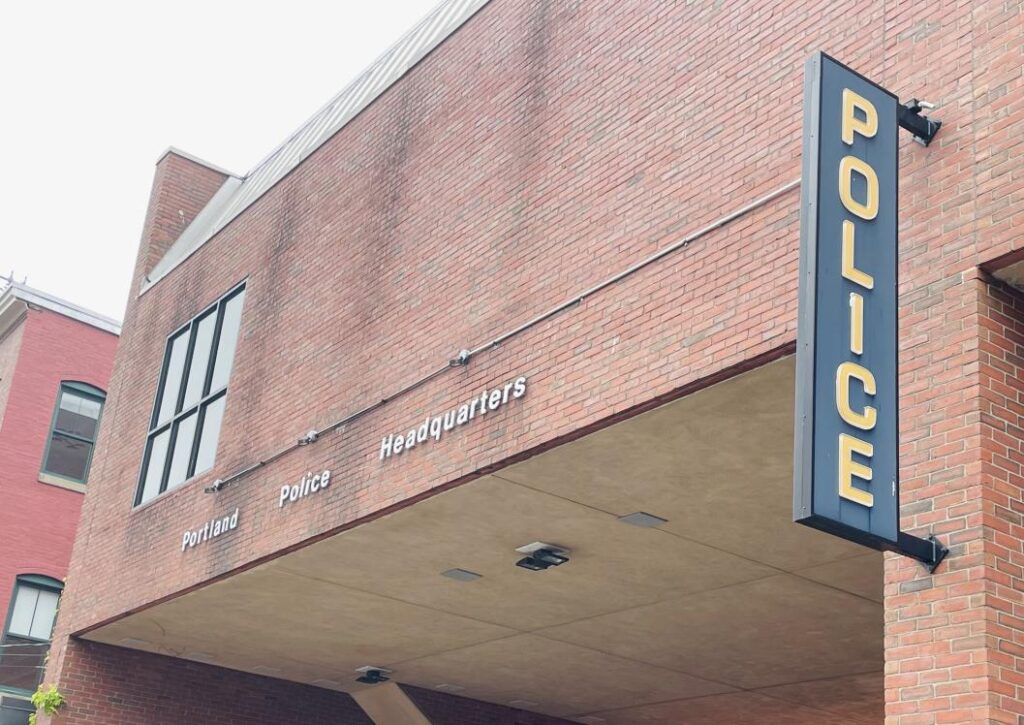
Police Raises Provoke Emotional Debate
Order 245, concerning a 14% increase in police department funding, prompted an emotional debate from the Council.
Councilor Phillips spoke first, saying that although she is “not against the police department whatsoever,” she still felt “very uncomfortable” about the events of April 1st and can’t support giving the police more money following that incident. She proposed giving half the increase now, and half the increase in a year, after the police demonstrate that they are addressing issues of racial bias in the department.
Dion, a former police officer, was quick to jump in. He argued that the 14% increase was necessary for retaining and recruiting officers, and scoffed at the idea that the additional funding should be in any way linked to the police response on April 1st. “There was no misconduct,” said Dion, who also emphasized that many do not understand the challenges of the job. “We’re not having the same conversation about CNAs, and people die under their care,” he added, before making a similar comparison to firefighters.
Councilor Fournier responded, agreeing with Phillips’ assessment that the April 1st rally and the police funding are linked events. “I can’t un-join the two,” said Fournier. She shared a conversation she had with a police officer during a ride-along where the officer said that an improved work environment is more important than a pay raise, leading Fournier to support Phillips’ incremental increase suggestion.
Responding to Councilor Dion’s comment that people don’t understand what it’s like to be a police officer, Councilor Pelletier asked if he could “understand what it’s like to be a Black person in this city.” She underlined the connection between systemic racism and policing, and stated that increasing the police budget would not make the city any safer or less racist.
Councilor Rodriguez shared that he considers this budget item separate from other issues in the city, and indicated his support for compensating officers at market rate. He added that he didn’t believe stagnating wages would fix the equity issues facing the city, and could have the opposite effect instead. Snyder echoed some of Rodriguez’s sentiments, explaining that it’s challenging to hire officers when neighboring municipalities have higher wages.
Dion spoke again, this time to retract his CNA analogy, calling it “really bad.” He apologized for the comment, clarifying that his point was that no institution is perfect. “I was a little ‘triggered,’ to use your language,” he said, seemingly to Pelletier.
“I was a little ‘triggered,’ to use your language,”
Councilor Mark Dion
Councilor Trevorrow came down on the side of Rodriguez and Snyder, viewing the situation from an employment perspective.
Phillips spoke up once more, the last comment on the matter. She reiterated that she is not against the police department, but took offense to the idea that “I, as a Black woman, am told that I need to understand what the police department is going through… I can’t take my Blackness off,” she said, her voice wavering. She also shared that she regularly worries about her son’s safety in Portland. “People will never understand what I go through,” she went on, again citing concerns about the events of April 1st.
At the vote, Fournier, Phillips, and Pelletier opposed the order. All other councilors voted in favor, enabling it to pass 6-3. Because it could not secure seven votes, it did not pass as an emergency, meaning it will only take effect after ten days. Thank you to John for the additional information.
The remaining budget orders – Order 253 and 254 – passed unanimously. All were passed as an emergency and went into effect immediately.
O’Connell and West thanked the council and the Finance Committee for their work on the budget.
Orders
Despite the passage of the budget, the mood among the council was still emotionally charged following the policing debate, prompting Councilor Ali to suggest a brief break. The Council paused for ten minutes and resumed the agenda around 8:30 PM.
Orders 256, 257, 258 and 259, all relating to engagements with Visit Portland, the regional tourism bureau, were all postponed until September 6. West shared that Visit Portland is aware of the postponement and had in fact requested it themselves.
Correction: A previous version of this article stated that these orders were postponed indefinitely, thank you to Eamonn.
Order 260 would enable voters to decide whether the city charter should be amended to adopt gender neutral language. One amendment was recommended by Corporation Counsel; the amendment would enable the language changes to be implemented more quickly, if voters are in favor of it. Both the amendment and the order passed unanimously, meaning the question will be posed to voters in the fall.
Referendum Reform
Similarly, the following Order 261 would also place on the November ballot a question for the voters, this time concerning the “Citizen Initiative” process, so heavily employed over the past several years in the city.
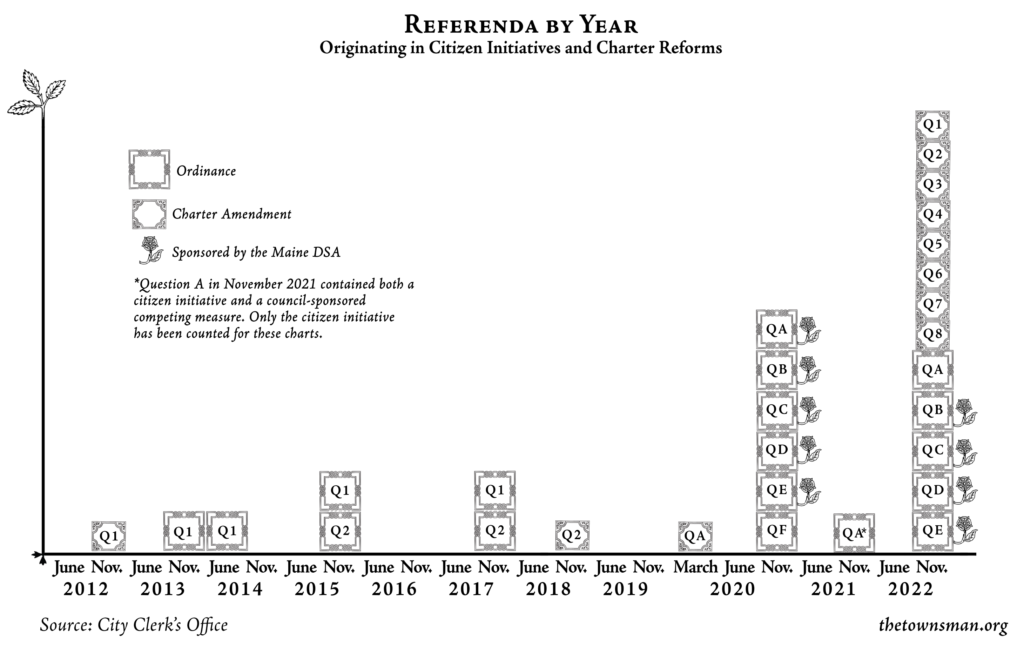
These proposed amendments to Chapter 9 of the city’s code, which establishes this process, had been hashed out over the course of months across two workshops involving the entire city council. Public comment had been taken at the second of these workshops, and by the end a comfortable majority had backed the bundle of reforms in front of the council on Monday. The main points of the reforms were as follows:
- Currently, ordinances passed by citizen initiative cannot be amended or repealed for five years, except by another referendum. This reform would allow the City Council, with a supermajority of six votes, to make such amendments after 18 months. With only a simple majority, the constraint would remain at five years.
- Petition circulators, those individuals who ask residents to sign petitions in support of citizen initiatives, would be bound by new rules with the intent of cracking down on misleading “petition farmers.” These would include swearing oaths that they provide the opportunity to review the full context to every signatory.
- Initiatives would only be voted on during November elections, not low-turnout June elections.
- City staff would review all citizen initiatives and prepare fiscal impact statements, estimating the effect these would have on the city’s budget. These statements would be made public, and included on the ballot.
- If the impact is estimated to be over $50,000, ordinances enacted by referendum wouldn’t go into effect until the following July 1st. The 5 year/18 month ‘timer’ would not begin until the 1st as well.
- City Clerk and Corporation Counsel would have new powers to ensure summaries and titles of initiatives are unbiased descriptions of the proposed ordinance, and that it “correctly integrates” with existing ordinances and other administrative processes.
Many had expected, given the broad consent the council showed during the workshops devising these proposals, that they would be approved for the November ballot. But in the days prior to Monday, a social media uproar from organizations including Progressive Portland and the Democratic Socialists of America urged the council to prevent these proposals from going to the voters in November, accusing those pushing for such modifications of being anti-democratic.
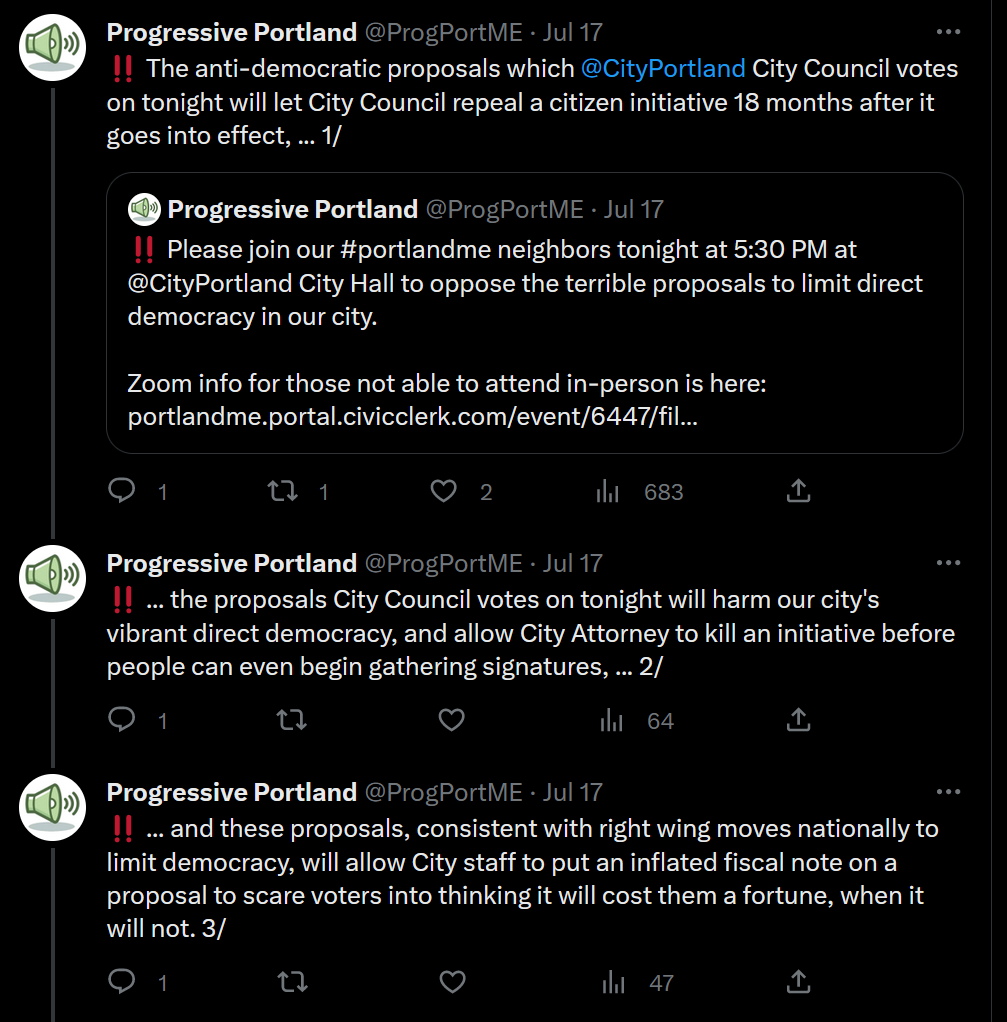
Before public comments began, which especially for the late hour (around 9:30 PM) had brought out many voices in chambers and on Zoom, Mayor Snyder chose to respond to these accusations. She stressed that Chapter 9 had been a long-term source of public outreach, that many residents had been asking for the council to discuss reforms, and that the chapter had been untouched since its last amendment in 1991. Snyder also reminded the public that the council was not voting to enact these changes unilaterally, but rather to send them to the voters and allow them to decide. The process for amending Chapter 9, she explained, is very strict, and requires the City Council to recommend changes to voters, and for the voters to approve them at the ballot box. Neither the council nor the citizenry could amend it on their own, nor could the council delegate the power to a commission or other body.
Mayor Snyder went on to recount a brief history of this reform process, which began in December, 2022. At that time, during a goals-setting workshop, she floated the idea of Chapter 9 reform. This met with ambivalence from other councilors, so she allowed the matter to drop. It wasn’t until February of this year that councilors, a majority in fact, reached out to her asking if the matter could be picked up again. In response she had city staff prepare options for the council to consider, primarily based on Maine’s state-level referendum process, and scheduled a series of workshops for the council to work out a consensus. Between fruitful discussion among the councilors and public input, the resulting product was something Snyder defended.
There was no intent to ‘pull a fast one’ on the city of Portland.
Mayor Kate Snyder
Nevertheless, after the outpouring of correspondence from residents in the prior days, some councilors clearly thought that amendments were necessary. Namely, Councilor Ali proposed scrapping the entire bundle of reforms, and instead just presenting a simple change of 5 years to 3 years, during which initiative ordinances can’t be amended. Councilor Rodriguez went further, also scrapping the whole bundle and offering instead only a small window for non-substantial, procedural amendments inside the 5-year window.
With the united front of the council already shattered, public comment began. A familiar voice, Steven Scharf, kicked things off by supporting the council’s reforms, and wished they had gone further; specifically he requested a higher threshold for number of signatures required, and for those signatures to require a certain number of residents from each city district. Jim Hall, on Zoom, followed suit, asking the council to send this question to the voters unamended. He too had another proposal, to make ballot questions which had a third option provided by council be computed by ranked-choice voting. This would eliminate the functional veto that council enjoys when placing initiatives on the ballot.
A woman named Sasha spoke up opposing the reforms, and further suggested that breaking up the nine-or-so proposals into separate questions would be more fair. Caitlin Hussar also opposed the changes, supported breaking them up, and suggested calling a commission to draft reforms. Such a commission, it should be noted, could only be advisory in nature.
Eamonn Dundon, of the Portland Regional Chamber of Commerce, spoke up strongly in favor of the council’s reforms. He urged the council to let the people decide, and decried the era of referenda as one of divisiveness, accusations, and shallow rhetoric. Following him on Zoom, a woman named Lila called these changes part of a nationwide pattern of restricting democracy and disenfranchising citizens. Peter McLaughlin, Peaks Island Council member, concurred, and said that strong initiatives were needed to prevent the council from “cozying up” to lobbyists.

Darren Fishell also brought up the idea of breaking them up into individual questions, and said any current ordinances passed by referenda shouldn’t be affected by these changes. Wes Pelletier, co-chair of the DSA, accused the reforms as being obviously intended to “combat” his organization, and that the council debating this topic at all was a waste of time, especially if the DSA wasn’t even being consulted.
More comments requested breaking up the proposals, and generally opposing any change to the process, sometimes with deep emotion. Damon, another DSA member, was among these, and stated that these reforms were poison pills from the council. Against these, Sarah Michniewicz thanked the City Council for their work in producing this collaborative effort. She urged the council to let the voters decide, though she had her own concerns about the nature of the fiscal impact statements and worried they could be biased in nature.
After closing public comment, approaching 10:00 PM, the council seemed hesitant to engage in further discussion. Eventually Councilor Ali broke the silence, asking the City Manager whether, in her decades of service, she had ever seen any council repeal any ordinance ever passed by initiative. She replied that she had not. Ali used this answer as evidence that fears of a vituperative council repealing citizen initiatives were ridiculous, and seemed indignant at the accusations of such.
“Disagreement is a dangerous place in Portland,” lamented Mayor Snyder, the subject of many of the most vindictive comments in the previous days. She emphasized that while she would have proposed slightly different reforms, that these were the product of compromise, and that disagreement “shouldn’t be personal.” She recalled instances where poorly-written citizen initiatives resulted in needless confusion and expensive litigation, such as that concerning minimum wage laws in 2020. An inadequately-written provision about emergency pay, Snyder relayed, had caused the city to become embroiled in a lengthy and costly lawsuit, that the city ultimately won anyway, all because of a mistake in a citizen initiative that couldn’t be amended. “We get criticized when we do something, we get criticized when we do nothing,” she concluded.
Only the Mayor and Ali, however, stood out among the miasma of exhaustion, vacillation, and hesitancy. Councilor Zarro, clearly having qualms, spoke after another pause in the conversation. He observed that whenever large groups of public commenters were there in chambers with them, it was nearly always about some referendum controversy. Zarro further, tentatively, defended the intent behind the proposals, asserting that they weren’t about discouraging or combating citizen initiatives. Nevertheless, he then began to discuss dilutions that the Council could make, and suggested that perhaps the city could isolate the broadly-popular “November Only” change for passage.
Councilor Fournier agreed, as she always had, that Chapter 9 had serious problems. But she now wondered aloud why the council was spending time on this issue, given how much the city has to worry about. She also expressed particular criticism for the fiscal impact statement. Councilor Rodriguez, one of the primary drivers for reform in workshops, significantly moderated his position. He said he would “feel comfortable” postponing most of the reforms to some unforeseen date, and maybe just putting the November reform on the ballot. Still, he wanted the council to do something this evening.
A meandering conversation about the proceduralism of their amendments then took place between Councilors Ali and Rodriguez, which seemed to finally push Councilor Phillips into making her move – moving to indefinitely postpone the reforms, speculating that some form of committee could be formed if they were “really going to be looking into” the question, something which they had apparently not been doing during the previous two workshops. Councilor Trevorrow also supported the idea of a committee.
At this point the City Manager and Corporation Counsel stepped in to clarify two points – first, that while there was talk about a committee of some sort, that no one had formally moved to form one, and that city staff had prepared nothing for such a proposal. Second, he stressed that city staff had none of the necessary time or resources to start this process again. If the reforms were postponed, it would most likely be the final word for a long time, at least until after the election.
Dion, in a highly uncharacteristic move, seemed to relent to the disappearing momentum and suggested that, unless they could act tonight, they ought to just give up on the whole idea until at least 2025, at which point most of the seats in the chamber may be occupied by new people. Dion had previously been a strong critic of the overuse of citizen initiatives, and his response here seemed to surprise many.
Councilor Pelletier finally added her own perspective, which was wholly in opposition to the entire idea of modifying Chapter 9 at all. Emphasizing that citizen initiatives were responses to an ineffective council, she supported the move to indefinitely postpone the process. With no one else willing to break the silence, the council moved to a vote on Phillips’ motion to indefinitely postpone.
It passed 6-3, with Snyder, Ali, and Rodriguez opposed.
Wrapping Up
With all the largest items on the agenda finally dispatched, only a few minor orders remained. First, appropriately, was Order 5, scheduling a hearing to review a new citizen initiative for the November ballot, this one an act to exempt small landlords from the rent control ordinance. This hearing was set for August 14th, unanimously, and shall mark November as the third election in a row to feature a citizen initiative amending the rent control ordinance.
Finally, a number of first-reads were pronounced. These included approving the construction of an affordable housing building on Casco Street, accepting and appropriating $50,000 for the Lincoln Park Fence Project, adjusting parking policy on Fore Street, and making a zoning amendment to accommodate new development in East Deering.
The meeting was adjourned at 10:21 PM.
Erica Snyder-Drummond – Erica is a proud Portland resident, documentary filmmaker, and baker. Previously she has been a campaign canvasser, an immigration advocate, and a server. You can see more of her work at www.ericajsd.com.
With contributions from Ashley Keenan, editor.


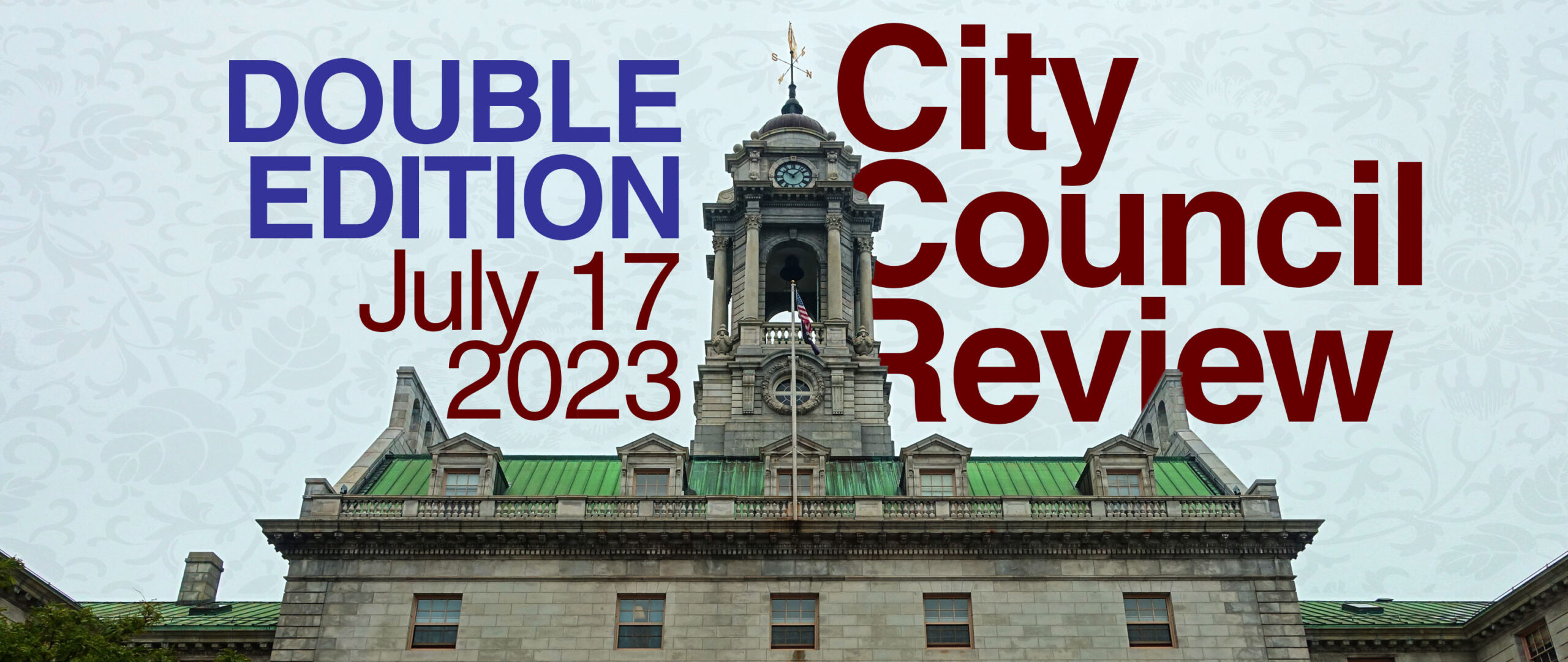
This is great as always! One minor correction is that the Visit Portland orders were postponed to September 6th, not indefinitely as the article states.
Thank you Eamonn, this has been updated!
One minor clarification. The police budget passed 6-3, but did NOT pass an emergency, which requires 7 votes. It will go into effect 10 days after the vote. But because it included a retroactivity date, the impact is likely the same.
Thank you John, this has also been updated.
Nice use of the word ‘miasma’!